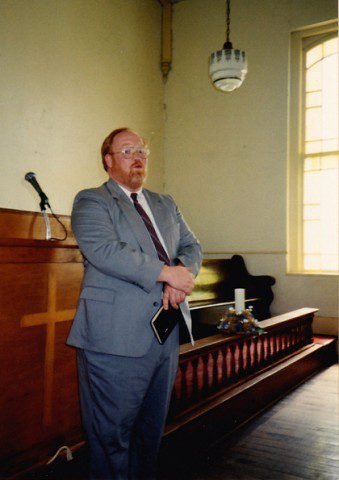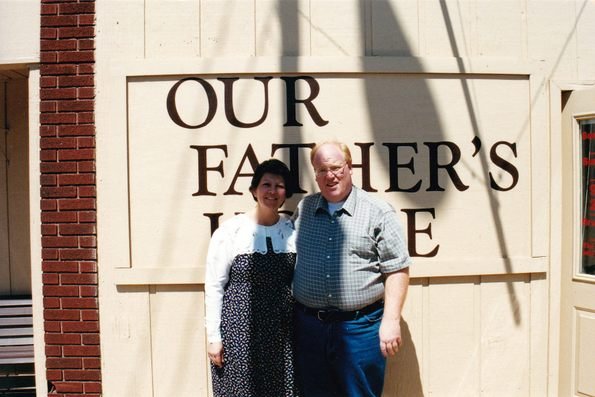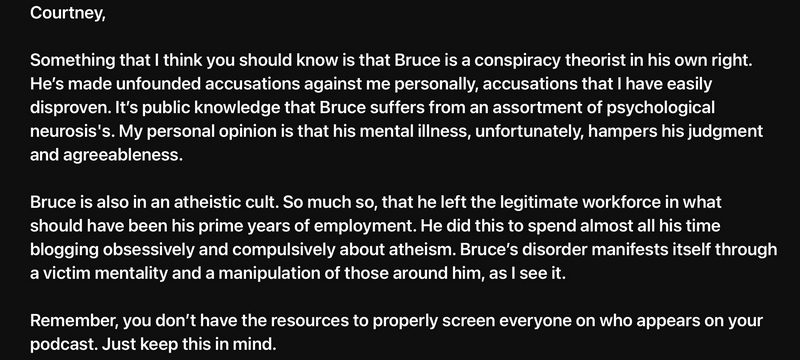
Earlier, I wrote a post titled, Catch-All Bible Verses: Is the Human Body the Temple of the Christian God? Today I want to deal with another catch-all Bible verse, Psalm 101:3:
I will set no wicked thing before mine eyes: I hate the work of them that turn aside; it shall not cleave to me.
Evangelical preachers love this catch-all verse because it allows them to demand of congregants abstinence from seeing and using things or having contact with people, churches, and ministries they deem “wicked.” Whether something is wicked is determined by the pastor’s personal interpretations of the Bible, social, cultural, and religious experiences, and personal preferences. In other words, something is wicked because the pastor says it is, end of story. Since he is the man of God, the one chosen by Jesus to lead and teach the church, congregants are expected to believe and follow his “Biblical” pronouncements. If he says a certain behavior or inanimate item is wicked, then congregants are expected to nod their heads up and down and say, Amen brother, preach it!
Things labeled “wicked” are considered off-limits — Kryptonite to true Christians. Congregants, wanting to be obedient to God and his man, the pastor, bow — at least outwardly — to the subjective pronouncements of church leaders. Diversity of opinion and freedom are discouraged, if not outright forbidden. Congregants are expected to fall in line, obey, and follow Pastor Pied Piper. People who dare to think for themselves and publicly disagree with the man of God are told to either conform or leave. In some churches, non-conformity is viewed as rebellion against God’s established order. Erring congregants are brought before the church to be critiqued, judged, and disciplined. People are given two choices: excommunication or submission.
In 1994, I found myself, as the co-pastor of Community Baptist Church in Elmendorf, Texas, at odds with my fellow pastor, Pat Horner. (See I Am a Publican and a Heathen.) I disagreed with Horner — the founder of the church — on a number of issues, and due to the increasing hostility of our disagreements, I decided to resign from the church and move back to Ohio. Horner informed me that I couldn’t resign and that since the church decided whether I could be a member, it was up to them to decide whether or not I could resign. I, of course, refused to obey his pronouncements. I packed up my family and our meager belongings and returned to Ohio. As we were leaving, Horner had gathered congregants together for a disciplinary meeting. The subject? What to do about the Bruce Gerencser problem. I was deemed wicked and rebellious by Horner and his sycophants, and after the “facts” were presented, the church excommunicated their co-pastor. In their minds, my refusal to play by Horner’s rules was grounds for ex-communication. To this day, the church continues to consider me a heathen. My current atheistic beliefs and lifestyle are proof to them that excommunicating me was the right thing to do. Polly and our six children were not excommunicated. Horner and the church decided that my family was under my satanic control, and should not be held accountable for my “sins.”
My excommunication is a good example of a pastor determining what is “wicked” and then demanding that congregants not set that wicked thing before their eyes; the wicked thing being a flesh-and-blood human being. This catch-all verse can be used to label people, inanimate objects, and behaviors “wicked.” Pastors, then, are able to bend and mold congregants to their wishes; that is, unless they have a rebellious member such as Bruce Gerencser. Then, church discipline is used to cull the offender from the church and put the fear of God into the hearts of congregants.
The churches I pastored, with one exception, didn’t excommunicate rebellious church members. Instead, I was the gatekeeper. I determined who stayed and who had to go. If I determined through much prayer and fasting — just kidding, my determinations were based on my personal opinions, beliefs, and practices — that someone was no longer a good “fit,” I would encourage them to seek out a new church that would better meet their needs.
Over the twenty-five years I spent pastoring churches, I ran off a lot of good people whose only crime was that they disagreed with me on a matter of doctrine or practice. Instead of embracing differences of belief and practice, I demanded fealty to my beliefs, interpretations, and practices. For many years, I believed it was sinful to own and watch TV. In my mind, if there was ever a human invention that was wicked, it was the television. I am sure Polly and my children can remember our TV being unplugged and having a piece of paper taped over the screen that said, I will set no wicked thing before mine eyes.
Several years ago, I wrote a post titled, The Preacher and His TV. Here’s some of what I had to say:
My wife and I married in 1978. One of our first purchases was a used tube console color TV that we purchased from Marv Hartman TV in Bryan, Ohio. We paid $125. We continued to watch TV for a few years, until one day I decided that watching TV was a sin. This was in the mid-1980s. After swearing off watching TV, I decided that no one, if he were a good Christian anyway, should be watching television. One Sunday, as pastor of Somerset Baptist Church in Mt Perry, Ohio, I preached a 90-minute sermon on the evils of watching television and going to the movies. I called on all true Christians to immediately get rid of their TVs and follow their preacher into the pure air of a Hollywood-free world.
To prove my point, I gathered the congregation out in front of the church for a physical demonstration of my commitment to following the TV-hating Jesus. I put our TV in the church yard and I hit it several times with a sledge-hammer, breaking the TV into pile of electronic rubble. Like the record burnings of the 1970s, my act was meant to show that I was willing to do whatever it took to be an on-fire, sold-out follower of the King of Kings and Lord of Lords.
Just before I hit the TV with the sledge-hammer, a church member by the name of Gary said to me, Hey preacher, if you don’t want that TV I’ll take it. How dare he ruin my sin-hating demonstration! I thought at the time. I gave Gary a scowling look and proceeded to knock the devil right out of the TV. I am happy to report that not one church member followed in my TV-hating footsteps. What church members did do is make sure that their televisions were OFF when the man of God made an appearance at their home.
….
From 1998 through 2005, I purchased and got rid of at least six television sets. I gave one TV to the local crisis pregnancy center. I also gave one set to my son. The rest I sold at a loss. Why all the televisions? you might ask. Simple. After watching TV for a time, like a moth to a flame, I was drawn towards watching shows that I promised God I would never watch. Dear Lord, I promise I will only watch G or PG rated programming, and if there is any nudity, cursing, or gore I will immediately turn off the TV. No matter how much I wanted to be holy and righteous, I found that I loved watching programs that contained things that I considered sin.
My “sinning’ would go on for a few weeks until the guilt would become so great that I would say to God, you are right God. This is sin. I will get rid of the TV and I promise to never, never watch it again. Out the TV would go, but months later I would get the hankering to watch TV again and I would, unbeknownst to Polly, go buy a television.
It is clear now that my beliefs made me mentally and emotionally unstable. I so wanted to be right with God and live a life untainted by the world, yet I loved to watch TV. One time, after I came to the decision to get rid of yet another TV, Polly arrived home from work and found me sitting on the steps of the porch, crying and despondent. I hated myself. I hated that I was so easily led astray by Satan. I hated that I was such a bad testimony. Look at ALL that Jesus did for me! Couldn’t I, at the very least, go without watching TV for the sake of the kingdom of God?
I have written before about my perfectionist tendencies. I wanted to be the perfect Christian. God’s Word said to abstain from the very appearance of evil. Psalm 101:3 was a driving force in my life: I will set no wicked thing before mine eyes: I hate the work of them that turn aside; it shall not cleave to me.
Television was a wicked thing, I told myself, yet I continued to battle with my desire to watch sports and other programs on TV. Needless to say, the advent of internet, brought into our home a new way for me to be tempted to sin against the thrice holy God I pledged to serve, even unto death. I’m sure that my children will remember me putting a sign above our computer that quoted Psalm 101:3. This was meant as a reminder that we should NEVER view inappropriate, sinful things on the internet.
My three oldest children, now in their 30s, continue to rib me about my TV-crazed days. One of them will periodically ask if I am ready to get rid of our flat-screen TV. Their good-natured ribbing hails back to the day when their Dad acted like a psycho, buying and selling televisions. At the time, I am sure they thought I was crazy, and I wouldn’t blame them if they did.

I replayed the aforementioned battle over TV numerous times in my life. The object of my righteous anger changed, but the end result was the same: that which I deemed wicked had to go, and if congregants really, really, really loved Jesus, they would agree with me and excise from their lives that which the man of God labeled sinful. The goal was holiness, so who wouldn’t want to be as pure and holy as possible? Congregants would try to conform to my pronouncements, but for the most part all this did was turn their lives into a game. Church members lived one way at church or in my presence and another way when away from the Holy Spirit — AKA the Preacher or Pastor Bruce. Little did they know that I did the same. Try as I might to live out the teachings of the Bible and to strictly govern my life according to my interpretations of the inspired, inerrant, infallible Word of God, I failed too; not because of a lack of desire or commitment; but because I set for myself and others an impossible standard. I was human, as were the people I pastored. Much like the unwashed, uncircumcised Philistines of the world, Evangelicals have wants, needs, and desires. They do what they do because they are human. No matter how much Evangelicals preach, pray, and deny their humanity, in time their “flesh” wins.
And that’s okay. Life is meant to be lived, not denied. Evangelicals love to say, only one life, twill soon be past, only what’s done for Christ will last. The humanist version, however, goes like this, only one life, twill soon be past, and then you’ll be dead. There’s no God, Jesus, church, or preacher to please. All that really matters is this present life. Love, laugh, and enjoy your brief existence on planet Earth. It’s the only one you’ll ever have. Each of us determines for ourselves how we want to live. As an atheist, I still have certain “wicked” things I won’t set before my eyes; you know, things such as women with size 20 bodies in size 10 spandex, fat men like me parading around in public with no shirt, and Fox News. That’s about it. 🙂 Each to his own, I say.
Did you grow up in a church where Psalm 103:1 was used to label things, people, and behavior wicked? Did your pastor demand congregants live according to his moralistic pronouncements? Please share your thoughts in the comment section.
Bruce Gerencser, 66, lives in rural Northwest Ohio with his wife of 45 years. He and his wife have six grown children and thirteen grandchildren. Bruce pastored Evangelical churches for twenty-five years in Ohio, Texas, and Michigan. Bruce left the ministry in 2005, and in 2008 he left Christianity. Bruce is now a humanist and an atheist.
Connect with me on social media:
Your comments are welcome and appreciated. All first-time comments are moderated. Please read the commenting rules before commenting.
You can email Bruce via the Contact Form.












